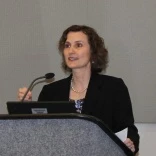While governments around the world struggle with trying to expand job creation, the need — and challenge — is all the greater in post-conflict and fragile states, which all too often feature high youth unemployment, scarce formal sector jobs, weak institutions, and a lack of social protection, on top of the loss of lives, assets, education, and disruption from the conflict itself. In recent conversations with policymakers from Liberia and the Democratic Republic of Congo (DRC), the Jobs Knowledge Platform gained further insight into some of the biggest challenges, especially in sub-Saharan Africa. While both spoke of desirable microeconomic interventions, they started by emphasizing the macroeconomic ones.
Gabriel Fernandez discusses the importance of financial discipline in Liberia
Both Gabriel Fernandez (National Social Protection Coordinator, Liberia) and Jean Jacques Purusi Sadiki (Administrator, Ministry of Employment, Labour and Social Welfare, DRC) insist that a top priority is stabilizing macroeconomic conditions. This is needed to provide stable expectations regarding inflation and exchange rates, stimulate growth, and help reduce the risk of further unrest and keep from discouraging investment. The IMF's most recent World Economic Outlook not only shows significantly lower growth in fragile states but also highlights how fragility itself can continue to suppress opportunities.
For Fernandez, the push for macroeconomic stability is key, particularly as it paved the way for achieving huge debt reductions under the Heavily Indebted Poor Countries initiative — in effect, making Liberia bankable again. In fact, in Liberia growth rates have been topping 10 percent since the end of the conflict. However, establishing fiscal order can be daunting, even for resource-rich countries like the DRC in part because of ongoing conflicts. Purusi Sadiki reports that up to 70 percent of fiscal revenues in the DRC are going to the war effort, with significant debts continuing to accumulate. As a result, the country remains extremely vulnerable, despite enormous inflows of aid and some debt relief in 2010.
Leadership and Good Governance
A second priority is reestablishing the rule of law to enhance the credibility of the larger system and establish a sense of common expectations of treatment across all groups in society. Purusi Sadiki argues that the DRC's best hope lies in strong leadership, combined with good governance, the rule of law, empowering women, and a strong civil society. He actually singles out Liberia as a case the DRC is trying to emulate. He also sees the existence of vibrant media outlets and the large network of schools — owned and run by the private sector — as well as contributions of ex pats as having critical roles to play.
Greater Social Protection
A third priority is the need for greater social protection. The temptation to provide needed services in these hard-hit countries is high, although that can imply a large outlay of resources, which would jeopardize macroeconomic stability. This is where careful choices can avoid such a trade-off. Better fiscal management can restore confidence and enable debt reduction benefits to be realized, which would reinforce the ability to reduce fiscal deficits — and, importantly, give more fiscal space to provide some social benefits. Both men point to the needs on the education and health fronts. They also hope their countries can tap new uses of technology in managing social protection systems (such as identity cards with banking information that can improve targeting and help avoid middlemen in making payments).
The World Bank-IMF Global Monitoring Report that tracks progress on the Millennium Development Goals (MDGs) notes that fragile states — those with internal conflicts or severe political instability — are those least on track to achieve the MDGs by 2015. However, there does seem to be a glimmer of hope, according to a new World Bank study that reports that 20 fragile and conflict-affected states have recently met one or more targets under the MDGs, and an additional 6 countries are on track to meet individual targets ahead of the 2015 deadline.
Jobs for Youth
But to ensure any new prosperity is shared, a key challenge for these countries is to ensure there are opportunities for the young — which in the DRC, make up 70 percent of the population. Much of the focus is on demobilized youths, with the real risk that they could turn to conflict if they see few rewards from productive engagement in society. Compounding matters is that, as Fernandez notes, the unskilled youth are forced into the informal sector, which now encompasses almost 90 percent of Liberia's workforce. Moreover, the share of young people entering the labor force will continue to grow in the coming years.
The international community is stepping up its support to fragile countries. In 2010, 38 percent of official development assistance (ODA) went to the 44 fragile states; half of it to 7 countries, for which the DRC was second only to Afghanistan. At the same time, IFC, a member of the World Bank Group, is boosting investment and advisory activities in fragile and conflict-affected countries and regions to help private businesses expand, create jobs, and spur economic development. In fiscal year 2012, IFC invested more than $530 million in countries affected by fragility and conflict and provided advisory services, including through the Conflict-Affected States in Africa program. IFC aims to increase investments by 50 percent over the next three years, working in coordination with the World Bank and the Multilateral Investment Guarantee Agency (MIGA).
* * * * *
A final note. The DRC's motto is striking, particularly in the inclusion of the third value on par with the first two. "Justice — Paix — Travail" — which means "Justice — Peace — Work." Clearly the three are intricately related. May all three be achieved.
This post was first published on the Jobs Knowledge Platform.


Join the Conversation